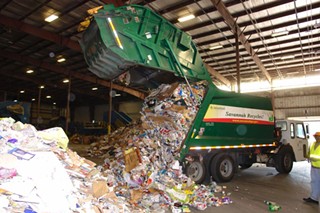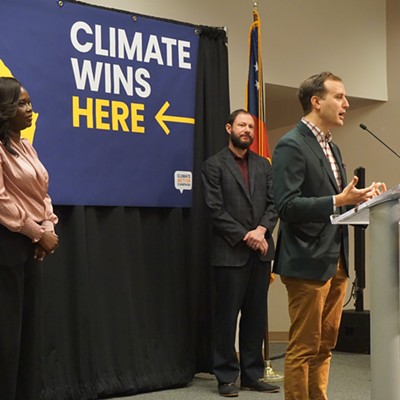In October 2007, mainly to quell an unusually 'green' electorate that year, County Commissioners passed a well-meaning, yet non-binding, resolution calling for Chatham to become the "Greenest County in Georgia."
The ballyhooed announcement and subsequent media blitz lead to much back-slapping amongst County incumbents, as the legislative action helped deliver enough votes in November to retain every seat.
Tasked to provide the resolution's plans and goals, however, was the politically venerated Chatham Environmental Forum (CEF), a coalition of business, government and advocacy interests that has been "quietly assisting the community in tackling some of the area's most challenging environmental issues since 1989."
After a few brief months, the CEF generated a comprehensive road map for commissioners. They categorized the county's pressing environmental issues, identified common sense first steps and laid out an actionable vision for the future.
But, within the document's 52 pages of information and suggestions, there was no recommendation to develop a curbside recycling plan for the 32,000 households in unincorporated Chatham County. That was quite a striking omission for a County vowing to be the "greenest."
It was also around this time, late 2007 and early 2008, when Karen Grainey, a local wildlife expert and barrier island tour guide, began a petition drive she hoped would compel the City of Savannah to begin its own curbside recycling program.
Back then, Savannah's environmental policies were (and still are) a few steps ahead of Chatham's, however, they too were lacking initiative to begin city-wide recycling.
Grainey's original goal, with initial support from just a handful of residents, was to simply raise awareness of the issue and possibly put a modicum of pressure on City representatives. The group, which took on the name Citizens for Curbside Recycling, figured roughly 10,000 signatures was an achievable goal and surely enough to get noticed.
Spring and summer 2008 was the petition's peak popularity, recalls Karen Grainey.
"I think at one point we had petitions in over 120 businesses in Downtown Savannah, all over the city, really. We couldn't have done it without business owners' involvement," she says.
When the drive was finished, Grainey presented then-City Manager Michael Brown with a milk crate full of signed petition pages. City representatives said they already had a curbside recycling plan well in the works, but it was difficult to deny the petition's role in jump-starting the process.
More to the point, though, there could have been an unprecedented special election if Citizens for Curbside Recycling legally submitted the petition to the city.
Georgia's State Constitution, specifically Municipal Home-rule code O.C.G.A. § 36-35-3, states "Amendments to charters or amendments to or repeals of ordinances, resolutions, or regulations... may be initiated by a petition, filed with the governing authority of the municipal corporation."
Of Savannah's 59,161 registered voters (2007), only 15 percent, or 8,874 valid signatures were necessary to trigger a special, city-wide up or down vote regarding curbside recycling.
Grainey had required that all petition signers be local, registered voters, however, there was no way to verify that during collection. There were surely many non-voters who signed.
But officially counting the signatures, with a special election as a possible result, was a risk city officials weren't willing to take. Steve Willis, vice chair of the Georgia Chapter of the Sierra Club, and direct aid to Grainey's petition, applauded the City's eventual recycling program implementation, however, he wanted the special election.
"The petition was never about forcing recycling on people or demanding anybody to do anything," Willis recalls. "I wanted the people of Savannah to go to the ballot to decide what happened."
The City of Savannah, on July 31, 2008, signed a 10 year contract with Pratt Industries, the world's largest, privately-held 100 percent recycled paper and packaging company, to sort all residents' recycling, as well as pay the city $15 per ton. Pratt built its own privately funded sorting facility in Chatham County with the ability to expand and accommodate all recycling the area could produce.
During that time, however, County Commissioners scoffed at the notion of accepting a similar offer from Pratt, and released a public statement which stated, in part, that Chatham "doesn't meddle in the business of trash hauling."
That short phrase basically lays out the conundrum of Chatham's curbside recycling prospects. In Savannah, trash hauling is a government operated service, while in the unincorporated county, it's a privately controlled, multi-hauler enterprise.
In all, Commissioners approved a fourth recycling drop-off spot for citizens to utilize, but that was the extent of their recycling efforts as Savannah began city-wide, home-to-home collections.
In mid-2009, Citizens For Curbside Recycling developed a petition for Chatham County. According to Grainey, it was made expressly clear that Commissioners would fight the legality of any signatures brought forth since Georgia code, seemingly, treats municipalities and counties differently when it comes to petitions.
Even though Chatham County had (and has) more registered voters than Savannah, and despite the promise of official opposition, the petition drive began.
Again, with dedicated support from local businesses and citizens, the recycling group collected over 22,000 signatures in 3 years.
It should be noted that in a place like Chatham County, where a wild success is 50 people at a political event, 20,000 plus signatures is quite the show of support. However, Commissioners claimed a small group of environmental radicals were attempting to force recycling upon the community.
"Of course I personally wanted curbside recycling for Chatham County," Grainey says, "but there were a lot of people who signed the petition who didn't want it. They understood it was about achieving the special election so voters could vote yes or no."
Ultimately, the petition was submitted to the County Board of Elections and deemed to have too few valid signatures from registered voters, roughly 2500 good signatures short.
After six years, and in spite of its dubious beginning, the "Greenest County" initiative has garnered notable and positive achievements. Chatham County determined its carbon footprint. It has been awarded a $300,000 Energy Efficiency Community Block Grant from the state. And, Commissioners approved a motion that requires all new County buildings costing over $100,000 be LEED certified at the Silver level.
The newly elected County Commissioners, however, might be more amiable to explore county-wide, curbside recycling options. Just a few weeks ago, Grainey and Dana Braun, a local attorney and former Savannah councilman, delivered a presentation to the current County Commission. They showed data from surrounding Glynn, Bryan and Effingham counties and detailed how these governments contracted with a privately operated, single hauler which also provides twice a month curbside recycling.
According to Grainey and Braun, the single hauler system costs half what the average Chatham resident pays for only trash pick-up.
Most would assume that 12 trash haulers competing in unincorporated Chatham County would drive prices down, but, oddly, the opposite is true.
Since they're all vying for a small sliver of residents overall waste, that sliver must be charged at a premium to make the most financial sense.
This drives trash collection prices higher and renders countywide economy-of-scale an impossibility.
But, should Commissioners pick a "winner" and choose a single trash hauler for all County residents? It seems harsh to the "losers," yet households would see significant savings and gain curbside recycling.
Should Chatham contract with a single recycling hauler and provide citizens with cheaper curbside recycling? About 75 percent of all "trash" is recyclable, so taking 75 percent of substance from local trash haulers, in any form or fashion, would be met with strong resistance.
Should we create county zones for haulers to bid on and service? The whole situation is tricky, full of competing interests, but the next chapter of Chatham County's curbside recycling journey will surely be written by concerned citizens and changed only through political action.



























